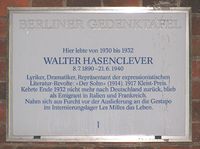Walter Hasenclever
| Walter Hasenclever | |
|---|---|
 |
|
| Born | 8 July 1890 Aachen, Germany |
| Died | 22 June 1940 Les Milles, France |
| Occupation | Poet, Playwright |
| Nationality | German |
| Literary movement | Expressionism |
| Notable works | The Son (1914) |
Walter Hasenclever (8 July 1890 – 22 June 1940) was a German Expressionist poet and playwright. His works were banned when the Nazis came to power and he went into exile in France; however, there he was imprisoned as a "foreign enemy". He died in Les Milles (Camp des Milles) near Aix-en-Provence.
Born in Aachen, Germany, the son of the doctor Carl Georg Hasenclever (1855–1934) and his wife Mathilde Anna (1869–1953), Walter Hasenclever began studying law at Oxford University in 1908 before changing to the University of Lausanne. From 1909 to 1914 he studied in Leipzig, where he became interested in literature and philosophy. In 1910 he published his first volume of poems, Towns, nights and people (Städte, Nächte und Menschen). In 1914 his play The Son (Der Sohn) was his first successful Expressionist drama.
At first, Hasenclever was pro-war and volunteered for military service; soon, however, he came to reject the war. He simulated mental illness and was released from duty in 1917. That same year he was presented with the Kleist Prize for his passionate adaptation of Sophocles' Antigone. He was a good friend of the artist Oskar Kokoschka who depicted him in his 1918 work "The Friends" with Käthe Richter in Dresden, where Hasenclever was recuperating from his "illness" in a sanatorium.
...
Wikipedia
